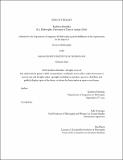Speech Therapy
Author(s)
Hintikka, Kathleen
DownloadThesis PDF (312.7Kb)
Advisor
Haslanger, Sally
Terms of use
Metadata
Show full item recordAbstract
Words can hurt. Most theorists who are working on speech and harm, even across disciplinary lines, agree to that much. There is less agreement, however, regarding the mechanisms by which speech causes or constitutes harm. By way of paying special attention to the dangers of ordinary, and to varying degrees, “socially acceptable" language, my dissertation, Speech Therapy, is a three-part exploration of the ways that speech plays significant roles in constructing and maintaining unjust conditions of domination and subordination both between social groups and within the broader society, even when its effects are unintended or go unnoticed. The first paper modifies a Gricean account of implicature to accommodate implicature in the interrogative mood. I then argue that interrogative implicature can help us make better sense of certain kinds of common microaggressions. In the second paper, I focus more explicitly on the kinds of harm and subordination that speech can cast on its targets even when the target is not around to hear it. I argue that all socially significant speech — speech about race, class, etc. — articulated from any standpoint, contain second-personal vocative hails. That is, all socially significant speech, even that not uttered second-personally, contains a second-personal norm that implicates both the speaker and members of the targeted social category, even when no member of the targeted social category is invited as an interlocutor by the speaker. The resulting view is a non-ideal, intersectional, and situated approach to second-personhood. The final paper is about how the things we do with language can alter the epistemic landscape of our communities. I argue that slurs, pejoratives, and misused epithets, a class of terms that I will refer to as demeaning speech, constitute a specific kind of epistemic oppression. My view is not that demeaning speech causes epistemic oppression, but rather that demeaning speech constitutes epistemic oppression. The oppression occurs in the mere uttering of these terms; the act of making it such that someone might have their testimony discredited in the future, of inflicting epistemic risk, is itself an epistemic injustice.
Date issued
2024-02Department
Massachusetts Institute of Technology. Department of Linguistics and PhilosophyPublisher
Massachusetts Institute of Technology